- Home
- Darrell Maloney
A Whole New World: Ranger: Book 2 Page 2
A Whole New World: Ranger: Book 2 Read online
Page 2
Each of his men would not only be on time. They’d do whatever it took to be early.
Randy and Tom had been partners since the day Randy received his first billet in Lubbock Texas. They’d become best friends almost from the start. They worked well together and had an uncanny ability to read each other. They frequently finished each other’s thoughts.
In that regard, they were not unlike an old married couple.
Theirs was an easy partnership, because they genuinely liked one another. They enjoyed each other’s company. They got along famously.
It wasn’t friction which drove them apart. Rather, it was common sense.
“Say,” Randy said as they rode on horseback from downtown Lubbock back to their respective neighborhoods in the western part of the city. “Do you think we could do more good if we split up? You work your neighborhood and I work mine?”
Tom pondered the idea.
“But will you be able to make it through your day if you don’t have my wit and charm to brighten it? I mean, you remember the old commercial they made about me. A day without Tom is like a day without sunshine.”
“I’m pretty sure that was a commercial about orange juice, Tom. But I’ll play your silly game. Yes. I will miss your wit and charm tremendously. But I think I can survive without it.”
“And my boyish good looks.”
“Pardon me?”
“You’ll miss my wit and charm and boyish good looks.”
“Tom, you realize I like women, right?”
“Oh, me too, partner. Me too. But you and I both know that pretty women are attracted to me like flies on a turd pile. And when you’re with me you get all the ones I’m not interested in.”
Randy smiled.
“And I suppose this is your version of charming?”
“Hey, it is what it is, Randy. I cannot help that I’m God’s gift to the women of Lubbock County.”
“Oh, brother. So what do you think of my idea?”
“Your idea of splitting up so we can cover more ground?”
“Yes.”
Tom pondered the idea.
“Well, it does have merit. Why don’t we try it for a few days and see how it works out?”
And so it was that the Ranger team of Randy and Tom went their separate ways for the good of the community.
Of course, Tom had his own reasons for agreeing to the idea. He’d been ordered by Major Shultz to draw a horse from Company C’s stables. And Tom Cohen was quite possibly the only man in Texas Ranger history who truly hated horses.
If he were to continue to partner with Randy, Randy would have insisted they do their duties on horseback.
If, however, he and Randy were working different neighborhoods, they’d very seldom see each other.
Tom could let his horse graze in his back yard while he worked the neighborhood on his bicycle.
It was faster, more comfortable for him, and didn’t leave saddle sores on his butt.
Or piles of poop in his yard.
Tom tried to contain his enthusiasm for the idea of splitting up lest Randy figure out his true motives and quash the idea.
As the two rode through the streets of Lubbock they marveled at how quiet it was.
The streets were clogged with abandoned automobiles. Many of their hoods were still raised. When the blackout occurred the batteries of the vehicles all shorted out at once, leaving the drivers perplexed. Many of them went under their hoods in an effort to repair whatever caused them to roll to a stop. When they saw they weren’t alone, though, they realized the problem was beyond their capability. Many of them waited for hours for tow trucks which never came. Then they walked home in frustration and disgust.
Few of them, though, had a clue their cars would likely never move again. That in a hundred years they’d be nothing but rusty hulks, overgrown with weeds on slowly disintegrating pavement.
Other than the cars, the streets were virtually empty, save an occasional pedestrian walking home with a case of drinking water or a couple of plastic bags full of food.
None of them were friendly. None of them waved a hello or offered a “Good evening.”
They were all dazed and confused.
And terrified.
Chapter 5
“You’ve been expecting me?” Major John Cohen said to Steve Peters. “But why?”
“Because the world has gone to hell. And because you’re the only person in the neighborhood who knows I have a working radio. I knew it was just a matter of time before you sought me out.”
Steve had lost a lot of sleep, knowing that one of his neighbors knew of his radio.
After all, the prepper shows were all over the cable channels. Doomsday Preppers and Prepper Castle and Prepping on a Budget. There were others, but those were the ones Steve watched on a regular basis for tips to aid him in his own prepping efforts.
One of the things emphasized as being important in the shows was the ability to communicate with others after a worldwide “event.”
Not to communicate with just anybody. For that would be foolish, since most survivors would be ill prepared and would want to take what the preppers had. Possibly by force.
No, the preppers, it was said, would need the capability of communicating with others of their kind. Other preppers, while keeping their true identities and locations secret. Using a ham radio would enable them to do that.
By using ham radios, it was said, the preppers could help one another out by sharing information. About the scope of the disaster. Current and future threats. Safe passages. Which parts of the country to avoid. Where additional food sources might be available, and which sources were played out.
Steve assumed that it wasn’t just preppers watching the shows. He thought there was a good chance that John Shultz, the neighbor who’d helped him carry the parts of his antenna two years before, might have watched them too.
After he’d finished installing his antenna he’d taken the time to check into his helpful neighbor. When someone told him Shultz was a Texas Ranger, Steve’s first inclination was to panic.
But then he calmed down.
After all, he was doing nothing illegal.
He was simply preparing for a worldwide catastrophe, and everything he had was bought and paid for.
Perhaps it was a good thing that the only one in town who knew he was a prepper was a law enforcement officer. Theoretically, a cop was less likely to try to storm Steve’s house and take his provisions.
And cops knew how to keep secrets.
Shultz was a bit unnerved to find that Steve expected him to come to call.
But he didn’t let that deter him from getting down to business.
“Yes. I remembered you had a ham radio. I also heard you mention something about it being ‘EMP-protected.’ Is it still working?”
Steve didn’t answer him outright. It wasn’t necessarily that he wanted to be evasive or coy. It was just that he held all the cards and he knew it. And he wanted any use of his equipment to be under his terms.
“Might I ask why you need a ham radio?”
Shultz saw no need for secrecy or deceit. He was forthright and to the point.
“I’m a Texas Ranger. Right now my men and I are out of touch with our headquarters in Austin. I want to try to raise them to get instructions on our role in the blackout.”
It was a logical answer, and the one Steve expected.
“I’ll help you, under certain conditions.”
“Name them.”
“I don’t want this to be an every day thing. I will help you communicate with your superiors occasionally. I don’t want you showing up here every day wanting to check in, and exposing my efforts to hide in plain sight to my neighbors.”
“I suspected that’s what you were doing when I saw the eviction notice. And you have my word, I’ll only seek out your help when there’s no other way. What else?”
“From now on, you come only at night. You don’t knock on the door. You knock thre
e times on the front window. Wait ten seconds, then knock four more times. If I don’t respond, repeat the process every ten minutes until I do.”
“Okay. Anything else?”
“Two more things. That you never tell a soul about my radio or my location. The neighbors all think I’ve moved out and my house is empty. That’s why they haven’t looted my house like they have many of the others. I want it to stay that way. If anyone other than you ever shows up I will refuse them entry. If you or your men try to evict me by force or take my radio, I assure you there will be a heavy price to pay. I am probably more heavily armed than your entire detachment put together, and I know how to use my weapons. There are also booby traps set up all over my house. Lastly, if it appears you or your men are trying to take my radio by force, I have the capability of destroying it before you get close to it.”
“Those terms are acceptable,” Shultz said. “Hopefully this will be the only time I ever have need of your radio. I suspect Ranger HQ to be searching for ways to resolve the communications problem even as we speak. But you have my word, if I ever have need of it again I will come at night and follow your instructions. And I’ll never tell a soul about you or your radio.”
Shultz held out his hand. He wanted to convey to Steve he was a man of his word, and had every intention of honoring their agreement.
Steve willingly shook his hand, but for an entirely different reason.
For Steve wasn’t like John Shultz. He didn’t have the same sense of right or wrong. The same moral compass.
Steve saw the handshake and John Shultz’s word as his assurance he’d be able to rid himself of a major problem at his convenience. He smiled, thinking himself quite clever for a play on words.
For the major was his major problem. And the major’s agreeing to come over only at night, and to keep Steve’s existence a closely guarded secret would make it ridiculously easy for Steve to kill him.
But not on this particular day.
On this particular day he wanted to find out a bit more about his overly friendly neighbor. To see if he could use him for anything else before he died.
Chapter 6
Major Shultz was never allowed entry into the basement at Steve’s house. Steve wasn’t quite that stupid. The door leading into the basement was closed and the bookcase full of books fastened to the door was back in place against the living room wall.
When Steve bought the house one of its chief selling points was the full-sized basement beneath it.
“It’s one of the very few houses in the neighborhood which have a basement,” the realtor was careful to point out.
And that pleased Steve tremendously. For if few of the other houses on the street had basements, there would be no reason for looters to look particularly hard to find Steve’s.
Steve knew Major Shultz would be coming at some point. Communications would be a major problem, and it stood to reason he’d visit the one man in the neighborhood he knew could help him out.
The day after the blackout Steve moved the ham radio from his basement sanctuary and placed it at a work station in the back of his den.
In the part of his house which couldn’t be seen from the front window.
The part of his house which was still fully furnished.
Steve had tried to make this part of the house look lived in.
A small gas-powered generator sat in the center of the room, a ventilation hose leading from its exhaust to a nearby window.
Hooked up to the generator were three things: a small television set, a video game console and a DVD player.
Piled next to the television in a heap were an assortment of game cartridges and movies.
The controllers lay haphazardly on the arm of a leather recliner.
Shultz looked around the room. It was rather unkempt, with empty water bottles and food wrappers thrown here and there. On a small table next to the recliner sat a half-eaten can of Ravioli, a plastic spoon sticking out its top.
“This is where I spend my days,” Steve said. I spend my nights in an upstairs bedroom with my rifle at my side. “Every time I hear a noise I’m peeking out the window, watching for prowlers.”
“So your plan is for looters to see the eviction notice, look in the window, think your house is vacant, and then move on?”
“Exactly.”
Shultz was impressed, and nodded approvingly.
He suspected there was much more to Steve’s operation he couldn’t see. But he had no reason to pry.
And he didn’t have to.
For Steve had apparently developed a much looser tongue than he had before.
“Of course, I only have enough food and water for a few days. On Tuesday, maybe Wednesday at the latest, I’m going to have to start making resupply missions every two or three nights to get more food and water. But I know how to move quietly. And I know how to use the darkness as my friend rather than my enemy. So I don’t anticipate any problems.”
In Steve’s mind, he was playing a game of wits against an inferior opponent.
In Steve’s mind, he was conveying the information that he didn’t have a lot of provisions to spare. That he wasn’t worth robbing for his food and water. Just in case he was reading the major wrong and the major was there to steal from him.
And he didn’t have to rob him of the radio, although the major almost certainly must want it for himself. For Steve was generous enough to offer the radio and his expertise to the major. And the stipulations he placed upon it were not unreasonable and were only to ensure Steve’s personal safety. Surely the major could see that and would agree.
The fact was that Steve’s basement sanctuary and his stockpiles would enable him to live luxuriously for many years to come, even as most of the other survivors starved to death.
Or killed each other off over the meager food scraps available on the outside.
But that was no concern to Steve.
Neither was Major Shultz’s life. For he’d use the major as long as he needed. Then he’d simply kill him and bury his body.
But not in his own back yard.
He’d bury the body in the back yard of the house behind him. The house that really was vacant.
And he’d leave behind absolutely no traces whatsoever to indicate that the good major had ever been there.
“Quite impressive,” Shultz said as he surveyed the living room, the television and the video games.
“Looks like a little slice of heaven compared to the way the rest of us are living. And I think it’s genius, the way you made your house appear to be vacant.
“But what if they don’t come through your front yard? What if they jump your fence and come through the back?”
Steve smiled, as though expecting the question.
“Trust me. I’ve taken certain steps. No one will ever jump over my fence.”
He left it at that, and the major pried no further. It was obvious Steve had the utmost confidence in his security measures.
“Now then, Major Shultz. Do you know whether your Texas Rangers Headquarters has a working radio?”
“I know their control center did have one. Whether they were able to save it is probably a better question.”
“Do you know their frequency?”
“No. I should, but I don’t. I’m sorry.”
“Not to worry. I know someone who will probably know.”
Steve sat in a small secretary’s chair in front of his radio console. Shultz stood over his shoulder and watched. That might have unnerved many others in Steve’s position, but not Steve. Steve was convinced of his superiority to the man behind him, and was feeling a bit invincible.
He turned on his unit and set it to a frequency he was obviously familiar with.
Shultz wondered how it came on when the generator in the living room wasn’t running.
But then again, it merely confirmed what he already suspected. That there was much more to Steve and his operation than he let on. And that he had a battery backup sys
tem somewhere on the premises.
But he dropped it. It really was none of his concern. Unless he broke the law somehow, what Steve did on his own property was his business and no one else’s.
Chapter 7
Shultz was there for only one thing: to contact his superiors in Austin.
Steve keyed his microphone and hailed a friend somewhere else in the state.
“Little Boy Blue, you on today?”
There was no answer.
“Little Boy Blue, you on today?”
Still no answer.
“I guess not,” Shultz observed.
“Not to worry,” Steve said while adjusting the frequency. “I’ll try another source.”
“John the Baptist, come in.”
Shultz raised an eyebrow. Steve couldn’t see him, but explained anyway.
“He’s a Baptist chaplain at a small town jail in east Texas. He used to be a cop and was the president of the Texas Peace Officer’s Association for several years. If there’s a way to contact the Rangers by radio he might know.
He started to repeat his call when a tired voice came over the radio.
“This is John. Who’s calling?”
“Hello, John,” Steve said. “This is Big Bill in Waco.”
Shultz raised the same eyebrow again, but this time Steve didn’t explain himself. His name wasn’t Bill, big or otherwise. And they darn sure weren’t in Waco. But then again, Shultz knew enough about the prepper lifestyle to know they always kept secrets. Even among themselves. And part of the beauty of using a ham radio was that it was possible to hide your location. You could broadcast from right next door and say you were half a world away.
“Hey, Big Bill. How are things in Waco?”
“Pretty bad out there. The bloods are shooting the crips, and the Mexicans are shooting each other. I’m just glad I don’t have to get out much.”
“Yeah, it’s the same here. I hope the bastards kill each other off and leave the world to us decent people. Anything I can do for you today?”

 A Perilous Journey
A Perilous Journey The Yellowstone Event: Book 6: The Aftermath
The Yellowstone Event: Book 6: The Aftermath Eden Bound
Eden Bound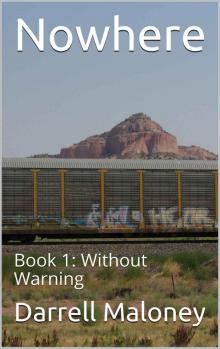 Without Warning
Without Warning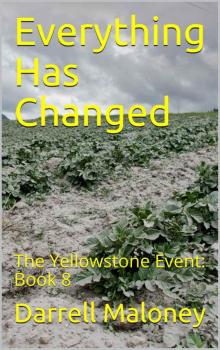 Everything Has Changed
Everything Has Changed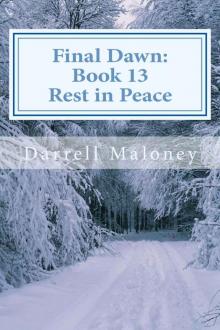 Rest in Peace
Rest in Peace This Changes Everything
This Changes Everything The Final Chapter
The Final Chapter It Can't Be Her
It Can't Be Her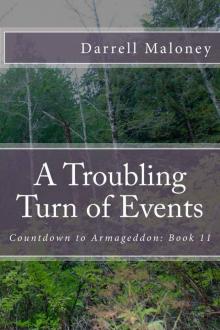 A Troubling Turn of Events
A Troubling Turn of Events The Blockade
The Blockade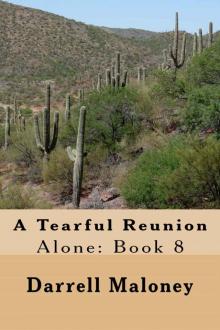 A Tearful Reunion
A Tearful Reunion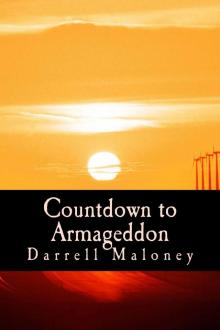 Countdown to Armageddon
Countdown to Armageddon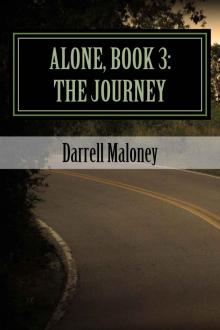 Alone, Book 3: The Journey
Alone, Book 3: The Journey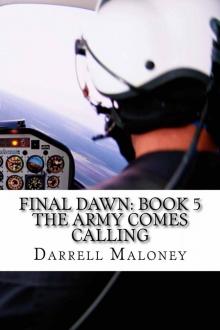 The Army Comes Calling
The Army Comes Calling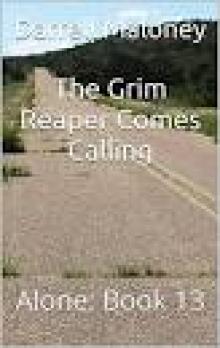 The Grim Reaper Comes Calling
The Grim Reaper Comes Calling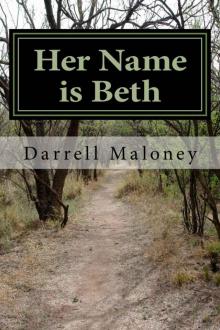 Her Name is Beth: Alone: Book 5
Her Name is Beth: Alone: Book 5 Red: The Adventure Begins
Red: The Adventure Begins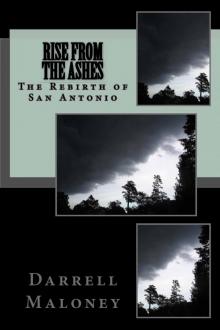 Rise From The Ashes: The Rebirth of San Antonio (Countdown to Armageddon Book 3)
Rise From The Ashes: The Rebirth of San Antonio (Countdown to Armageddon Book 3) An Unkind Winter (Alone Book 2)
An Unkind Winter (Alone Book 2)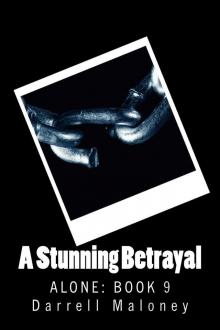 A Stunning Betrayal: Alone: Book 9
A Stunning Betrayal: Alone: Book 9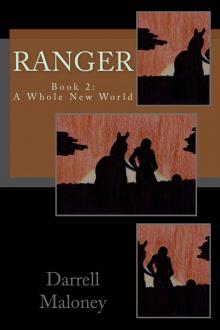 A Whole New World: Ranger: Book 2
A Whole New World: Ranger: Book 2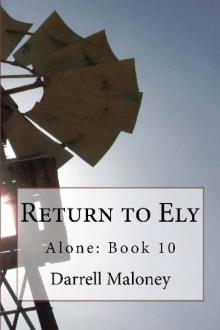 Return To Ely
Return To Ely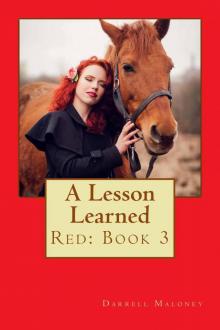 A Lesson Learned: Red: Book 3
A Lesson Learned: Red: Book 3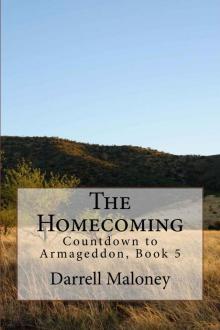 The Homecoming: Countdown to Armageddon: Book 5
The Homecoming: Countdown to Armageddon: Book 5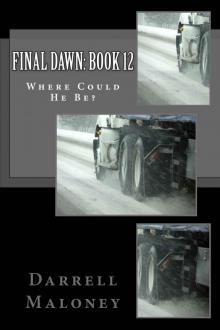 Final Dawn: Book 12: Where Could He Be?
Final Dawn: Book 12: Where Could He Be? An Acquired Taste
An Acquired Taste On Desert Sands: Alone: Book 6
On Desert Sands: Alone: Book 6 The Battle: Alone: Book 4
The Battle: Alone: Book 4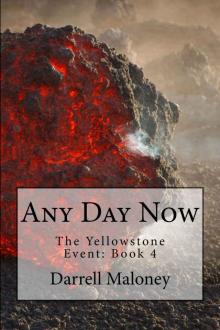 Any Day Now
Any Day Now Too Tough To Tame: Red: Book 2
Too Tough To Tame: Red: Book 2 No Help From Austin: Red: Book 5
No Help From Austin: Red: Book 5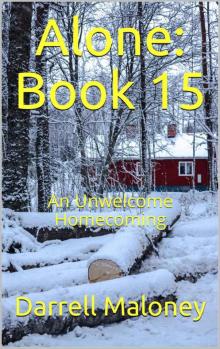 An Unwelcome Homecoming
An Unwelcome Homecoming A New Start: Final Dawn: Book 9 (Volume 9)
A New Start: Final Dawn: Book 9 (Volume 9)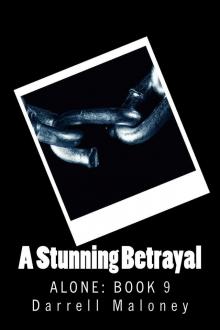 A Stunning Betrayal
A Stunning Betrayal An Undeclared War (Countdown to Armageddon Book 4)
An Undeclared War (Countdown to Armageddon Book 4)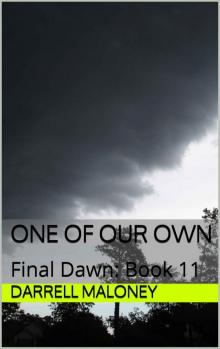 One of Our Own: Final Dawn: Book 11
One of Our Own: Final Dawn: Book 11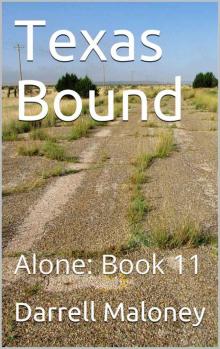 Texas Bound: Alone: Book 11
Texas Bound: Alone: Book 11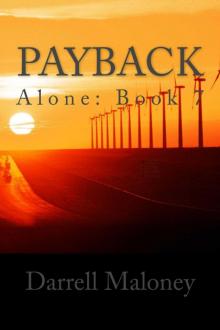 Payback: Alone: Book 7
Payback: Alone: Book 7 The Quest: Countdown to Armageddon: Book 6
The Quest: Countdown to Armageddon: Book 6 The Siege
The Siege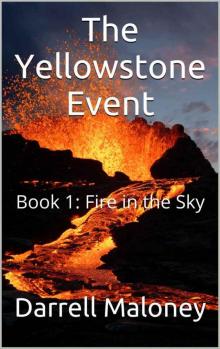 The Yellowstone Event: Book 1: Fire in the Sky
The Yellowstone Event: Book 1: Fire in the Sky Return to Blanco (Red Book 4)
Return to Blanco (Red Book 4) The Search
The Search AFTER THE DUST SETTLED (Countdown to Armageddon Book 2)
AFTER THE DUST SETTLED (Countdown to Armageddon Book 2)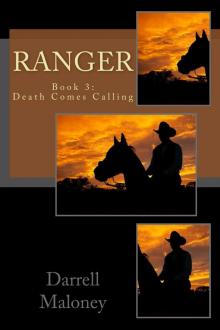 Death Comes Calling (Ranger Book 3)
Death Comes Calling (Ranger Book 3) A Long Road Back: Final Dawn: Book 8
A Long Road Back: Final Dawn: Book 8